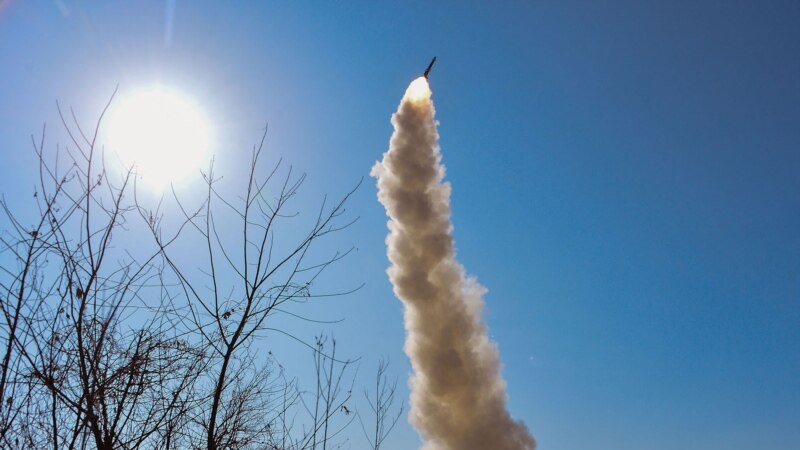
As Pyongyang continues to enhance its nuclear and missile programs while refusing to engage with Washington, analysts are divided on whether the U.S. should continue pursuing denuclearization or consider possible arms control options.
North Korea has been escalating tensions in the region with missile launches and threats to occupy South Korea if war breaks out.
Its latest launch came on Friday. The country test-fired what it called a new type of anti-aircraft missile and conducted “a cruise missile super-large warhead power test” off its west coast, according to state media KCNA.
It was the fourth cruise missile test of the year, after the launch of a hypersonic inter-range ballistic missile on Jan. 14.
U.S. State Department principal deputy spokesperson Vedant Patel said at a press briefing on January 24 that the U.S. is “eager to engage” with North Korea to “manage military risks” and to continue the goal of “complete denuclearization.”
As North Korea accelerates its missile tests, launching more than 100 since January 2022, some analysts said it would become harder to pursue the U.S. policy of denuclearization.
Daniel DePetris, a fellow at the think tank Defense Priorities, told VOA Korean via email that Washington’s efforts to seek denuclearization have long become “unrealistic.” Instead, he said, the U.S. should live with “a nuclear-armed North Korea over the long term.”
“No country on earth has constructed dozens of nuclear warheads only to negotiate them away,” DePetris said. “North Korea is not going to be the first, particularly when its conventional military capacity is weak relative to the U.S., and its Asian neighbors.”
Since North Korea’s fifth nuclear test in 2016, it has been developing missiles capable of carrying nuclear warheads.
It conducted more than 10 intercontinental ballistic missile-related tests since 2022 including Hwasong-17 and what it referred to as “the most powerful” Hwasong-18 in December 2023.
It refined solid-fuel technology that shortens the launch time to avoid being targeted and test-fired submarine-launched ballistic missiles (SLBM) as well as a spy satellite.
Talks have been stalled since the failed summit in Hanoi between former U.S. President Donald Trump and North Korean leader Kim Jong Un in 2019. Trump held two summits and an impromptu meeting with Kim but failed to reach an agreement on denuclearization that the U.S. sought and sanctions relief that North Korea wanted.
Ken Gause, senior adversary analytics specialist at the Center for Naval Analyses, told VOA Korean in a telephone interview on Monday, “The best thing to do is to freeze its nuclear program in return for sanctions relief and security guarantees.”
He continued that it is uncertain that North Korea would accept such a deal given its deepening military ties with Russia and economic support provided by China, but that Pyongyang would be more likely to engage with Washington and consider such a deal if Trump is reelected and makes the offer.
Citing unnamed sources, Politico reported in December that Trump is considering allowing Kim to freeze his nuclear weapons, rather than give them up, in exchange for financial incentives — if he wins the election. Trump quickly denied the claim.
“A long-term U.S. policy for North Korea needs to adapt to the recent fundamental shifts in North Korea’s approach to the international community as well as to the reality of North Korea being a de facto nuclear weapon country,” Frank Aum, senior expert on Northeast Asia at the U.S. Institute of Peace told VOA Korean via email.
However, other analysts warn of dangers of offering to let North Korea freeze its nuclear weapons and accepting it as a nuclear power.
Evans Revere, a former State Department official with extensive experience negotiating with North Korea, told VOA Korean via email, “A U.S.-DPRK negotiation aimed at achieving a freeze would effectively accept the permanence of North Korea’s status as a nuclear power.” North Korea’s is officially the Democratic People’s Republic of Korea (DPRK).
He continued, “It would damage the U.S.-ROK alliance, encourage the ROK to develop its own nuclear deterrent.” South Korea’s official name is the Republic of Korea (ROK).
Revere added that North Korea will “never allow the United States to take the steps necessary to effectively monitor a so-called freeze,” which he believes Pyongyang would not honor in any case.
North Korea announced several times in the past that it would freeze its nuclear program but reneged on its promises. The most notable was the 1994 Agreed Framework under which Pyongyang agreed to freeze its nuclear reactor program in exchange for help in building nuclear power reactors less suitable for fueling nuclear weapons.
Bruce Klingner, senior research fellow for Northeast Asia at the Heritage Foundation, said via email, “Eight failed nuclear agreements with Pyongyang does not engender optimism nor does the regime’s decades of vows never to abandon the nuclear arsenal it promised never to build.”
He continued, “While some experts claim a freeze agreement would be something new that should be pursued, the first four failed agreements with Pyongyang were attempts to cap the North Korea nuclear program.”
